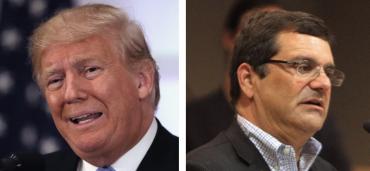
Over the long Christmas weekend, President Donald Trump signed U.S. Rep. Gus Bilirakis’, R-Fla., Congenital Heart Futures Reauthorization Act into law.
The House passed Bilirakis’ proposal last week. Earlier last week, the U.S. Senate passed its version of the bill, which was championed by U.S. Sen. Dick Durbin, D-Ill., and U.S. Sen. Todd Young, R-Ind., without opposition. U.S. Sen. Bill Nelson, D-Fla., who was defeated in his bid for a fourth term last month was a cosponsor.
Durbin, who lost his daughter to a heart condition, and Bilirakis--along with then U.S. Sen. Thad Cochran, R-Miss., and then U.S. Rep. Zack Space, D-Ohio--brought out the Congenital Heart Futures Act in 2009 to advance “research to build a set of best practices and understanding for how to screen and care for newborns with health defects.” The bill was included in then President Barack Obama’s federal healthcare law.
“This legislation will promote federal research on congenital heart defects (CHD) and raise awareness of the impact these health problems have throughout patients’ lives. The Senate-passed Congenital Heart Futures Reauthorization Act increases the funding authorization level for the Centers for Disease Control and Prevention (CDC) to $10 million per year, compared to the current funding level of $4 million, which will help states collect data on the prevalence of CHD and understand trends, health care needs, and disparities among the one million children and 1.4 million adults living with CHD,” Durbin’s office noted.
“It is estimated that there are currently between 2-3 million adults and children living in the United States with CHD, and nearly 1 in every 100 babies are born with a CHD,” noted Bilirakis’ office. “Sadly, five percent of these babies will not live to see their first birthdays. However, due to recent advancements in technology, CHD patients are surviving longer. This legislation seeks to build upon that success by ensuring continued investment in surveillance research to assess the lifelong needs of individuals with CHD. These surveillance efforts will help improve understanding of CHD across the lifespan, from birth to adulthood. The bill had originally passed the House in February of 2018, but only cleared the Senate this month.
“In addition, the legislation emphasizes the need for continued biomedical research at the National Institutes of Health (NIH) on the diagnosis, treatment, and prevention of CHD. NIH will further research the causes of congenital heart defects, including genetic causes, and study long-term outcomes in individuals with CHD of all ages,” Bilirakis’ office continued."NIH will also study data to identify effective treatments and outcomes, and identify barriers to lifelong care for individuals with congenital heart defects. CHD is a true public health issue that does not discriminate by race, gender, or socio-economic status. The road ahead may be scary and uncertain for any parent with a newborn who has CHD, but this meaningful legislation gives hope to those coping with the diagnosis. It will also expand the infrastructure to track the epidemiology of congenital heart defects. For the sake of those living with CHD and the estimated 40,000 babies who will be born in the next year with CHD, Congressman Bilirakis made this a priority. Research is key to understanding the causes of CHD, preventing it and improving treatment. The near unanimous passage of this important bill will improve the care of people with CHD at all ages and advance the field in critical areas.”
Bilirakis released a statement on Saturday after Trump signed the bill into law.
“Better data leads to better research,” Bilirakis said. “This bipartisan initiative is about giving hope to families who have suffered and improving the quality of life for millions of Americans by investing in life-saving research. Doing the right thing on behalf of sick kids is a moral imperative, and I am glad we were finally able to get it over the finish line.”


